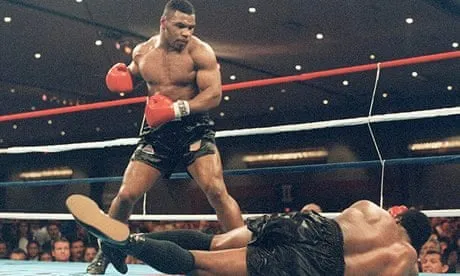In the world of boxing, few upsets have been as shocking as Mike Tyson’s loss to Buster Douglas on February 11, 1990. Tyson, the undisputed heavyweight champion, was expected to easily dispatch the underdog Douglas. However, in one of the most surprising moments in boxing history, Douglas defeated Tyson with a knockout in the tenth round, leaving fans and analysts alike stunned. Now, 34 years later, a former trainer has come forward with new insights that shed light on why Tyson, who was once invincible in the ring, was defeated by Douglas. This revelation not only revisits a historic upset but also offers a deeper understanding of what went wrong for Tyson.
Mike Tyson’s rise in the boxing world was meteoric. By the age of 20, Tyson had become the youngest heavyweight champion in history, and his dominance in the ring was unmatched. Known for his ferocious power and aggressive style, Tyson seemed unbeatable. His reign, however, began to show signs of vulnerability before the fight against Douglas.
Tyson’s training regimen and personal life had undergone significant changes in the months leading up to the Douglas fight. He had experienced a series of personal struggles, including the recent loss of his mentor, Cus D’Amato. Tyson’s focus and dedication were questioned, and these factors played a crucial role in his unexpected defeat.
Buster Douglas, a relatively unknown fighter from Columbus, Ohio, was not given much chance against Tyson. At the time, Douglas was seen as a mere stepping stone in Tyson’s career. However, Douglas had a different plan. He trained rigorously and approached the fight with a determination that shocked many.
From the outset, Douglas’s size and resilience were evident. He used his reach and size advantage to keep Tyson at bay, landing powerful punches that began to wear down the reigning champion. By the tenth round, it was clear that Douglas was not just fighting to win; he was fighting to prove a point.
Recently, former trainer and boxing analyst Teddy Atlas provided new insights into the Tyson-Douglas fight. Atlas, who had a long history with the sport and had worked closely with Tyson in the past, revealed that Tyson’s loss was not solely due to Douglas’s superior skills. Instead, it was a combination of Tyson’s declining physical condition and his weakened mental state.

Atlas pointed out that Tyson, despite being a formidable fighter, was not in peak condition during the Douglas fight. His training had been inconsistent, and his physical fitness was compromised. Tyson had gained weight and lacked the sharpness that characterized his earlier performances. According to Atlas, Tyson’s stamina was a significant issue, and he was not able to maintain the aggressive pace he was known for.
Additionally, Atlas highlighted Tyson’s psychological state as a major factor. The pressure of being an undefeated champion, combined with personal issues and the loss of D’Amato, had taken a toll on Tyson’s mental fortitude. Atlas suggested that Tyson’s confidence was shaken, and he was not mentally prepared for the fight. This lack of psychological preparation contributed to his inability to handle the challenges posed by Douglas.
The defeat to Buster Douglas had a profound impact on Mike Tyson’s career. It marked the beginning of a downward spiral that saw Tyson’s dominance in the heavyweight division come to an end. The loss exposed vulnerabilities in Tyson’s game that had previously been masked by his sheer power and aggression.
In the aftermath of the Douglas fight, Tyson underwent a series of changes in his career. He faced numerous legal and personal issues, which further affected his performance in the ring. Tyson’s journey from being the youngest heavyweight champion to struggling with personal and professional setbacks is a testament to how critical both physical and mental preparation are for success in boxing.

The surprising reason behind Mike Tyson’s loss to Buster Douglas offers several lessons for athletes and individuals in any field. It underscores the importance of maintaining both physical fitness and mental strength. Tyson’s experience highlights that even the most talented individuals can face setbacks if they are not fully prepared or if their mental state is compromised.
For aspiring athletes, the key takeaway is the need for consistent training and mental resilience. Success in sports, as demonstrated by Tyson’s career, requires not just physical prowess but also a strong mental game. The ability to handle pressure, stay focused, and adapt to challenges is crucial for achieving and sustaining success.
The revelation from former trainer Teddy Atlas provides a deeper understanding of why Mike Tyson lost to Buster Douglas. It is a reminder that even the most dominant athletes can experience unexpected defeats if they are not adequately prepared. Tyson’s loss to Douglas was not just a moment of surprise but a significant turning point in boxing history. The insights shared by Atlas not only revisit a historic upset but also offer valuable lessons on the importance of comprehensive preparation in achieving greatness. As we look back on this iconic fight, it serves as a reminder of the unpredictable nature of sports and the need for athletes to be at their best both physically and mentally.
News
Lil Wayne attends son Diddy’s birthday party: ‘Hope you become a talented person like dad Diddy’
Lil Wayne attends son Diddy’s birthday party: ‘Hope you become a talented person like dad Diddy’ I𝚗 а stаɾ-stuԀԀеԀ аffаιɾ tҺаt bɾσuɡҺt tσɡеtҺеɾ twσ ɡе𝚗еɾаtισ𝚗s σf musιc ɾσyаlty, Lιl Wаy𝚗е mаԀе а sρеcιаl аρρеаɾа𝚗cе аt DιԀԀy’s sσ𝚗 Kι𝚗ɡ Cσmbs’ 23ɾԀ…
Tia Kemp says Rick Ross is guilty of 𝚖𝚞𝚛𝚍𝚎𝚛-𝚏𝚘𝚛-𝚑𝚒𝚛𝚎 and being on Diddy’s “tapes: “I’m Going to Send the Feds Over There”
The baby mama drama between Tia Kemp and Rick Ross got really bad when Kemp threatened to “send the feds” over claims that Ross was working with Diddy and even killing someone. Over the years, they’ve used social media more…
TRUTH: Few people know that Lil Wayne and Diddy met each other because they shared a passion for partying while hanging out at bars
Lil Wayne and Diddy, two titans of the music industry, share a lesser-known connection that traces back to their mutual love for nightlife and revelry. Despite their prominence in the entertainment world, the story of how they first crossed paths remains…
DJ Khaled, Lil Wayne, Rick Ross and Wiz Khalifa Sit Down and Talk About Their Road to Success in an Unprecedented Interview
For the debut episode of the Self Made Tastes Better series in 2022, four of the top artists in hip-hop got down for an unprecedented conversation. Wiz Khalifa, Rick Ross, Lil Wayne, and DJ Khaled return to the roundtable to…
Rick Ross gave him a mini supercar and named him a billionaire ‘My son will definitely grow up to be a great man’
In a gesture both extravagant and heartwarming, rapper and entrepreneur Rick Ross recently made headlines by gifting his son a mini supercar, playfully dubbing him a “billionaire” and expressing confidence in his future greatness. The lavish gift, a symbol of…
Diddy spent $1.3M to give Rick Ross a souped-up golf cart as a housewarming gift after becoming his neighbor on the billionaire’s Star Island
Rick Ross received a lavish housewarming gift from Diddy after making a significant $37 million real estate purchase to become Diddy’s new neighbor on Star Island in Miami Beach. The ink had barely dried on the property paperwork, but…
End of content
No more pages to load











